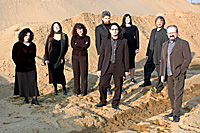Playing renaissance music for concert audiences requires not only precision musical talent, but a dedication to tedious research.
For the members of Lucidarium, it is that challenge which offers the sweetest reward when reconstructing the music of the past.
The Italy-based early-music ensemble is making their Seattle debut next week at Town Hall, as guests of the Early Music Guild, with “La Istoria de Purim,” a recreation of Jewish music and poetry from Renaissance Italy.
The program has won the award for musical creation given by the European Association for Jewish Culture and is the result of painstaking research, says the group’s founder, Avery Gosfield.
“Our “˜La Istoria de Purim’ adventure began when we realized that the Italian Jews of the Renaissance participated fully in the Italian sung-poetry tradition,” Gosfield told JTNews from her current home in Italy. “It was a logical outgrowth of all the other things we were doing.”
Gosfield, a Philadelphia native, moved to Europe and founded Lucidarium in Basel, Switzerland in 1991.
“After I received my Bachelor’s degree from Oberlin, where I studied the recorder, there was a choice between getting a Master’s at an American university or going to study in Europe,” Gosfield said. “What was supposed to be a year abroad never ended. I moved to Basel, Switzerland to study at the Schola Cantorum, which has a world-famous department for medieval and Renaissance music.”
Now, Lucidarium collaborates with educational and scientific institutions such as the Centre de Musique Ancienne de Genève and the CERIMM of Royaumont, a center of ancient music located near Paris, as well as with other scholars who have recognized the importance of early music on current history and culture.
“La Istoria de Purim” was a logical step for Lucidarium, Gosfield said, because it had historical significance and offered insight into a plethora of buried material.
“We stumbled upon an incredible repertoire of Italian Jewish music that had never been performed before,” Gosfield said. “We found amazing ties between the melodically rich Italian liturgy and early music… almost every town [in Italy] had its own tunes.”
For the eight core members of the ensemble, the delight in playing early music comes in interpreting pieces together as a group — after the research.
“There are weekends where the whole band meets to play, discuss, eat, laugh and argue until we find an interpretation that convinces us,” Gosfield said. “We have a lot of fun just playing and being together, and we’ve been told this comes across in our performance.”
Lucidarium has worked on other early-music pieces such as the influence of troubadours in Northern Europe and a CD of the music of French Protestants and Catholics at the beginning of the Reformation.
“We’re always on the lookout for sources that might have been neglected,” Gosfield said. “For example, songs that have survived in text-only form, or an early piece that has strong links to traditional music or vice-versa.”
When creating a program from the footnotes of history, it is as much about the time period as the music. In “La Istoria de Purim,” Lucidarium provides a sample of liturgical pieces but also embraces the culture of the period.
“It’s more about the music and poetry of daily life, of celebration,” Gosfield said. “It’s about the relationship of the culture of Italian Jewry with that of the population around them.”
For Gosfield, one of the two Jewish members of Lucidarium, it is also a chance to work closely with her historical heritage as well.
“Of course, after 25 years in early music, I can’t deny my pleasure at having found something that relates to my own culture, that conjugates my personal history and musical passion,” Gosfield said.
The members of Lucidarium are now busy researching another Jewish early music program based on the music of the Ashkenazi Jews in the 16th century.
The program is being promoted with the help of a German musicologist, Diana Matut, who wrote her doctoral thesis on a text-only source of German songs, written in Hebrew letters.
“We like doing things the hard way,” Gosfield said. “So now we’re off on a new adventure.”
The renaissance of Renaissance
